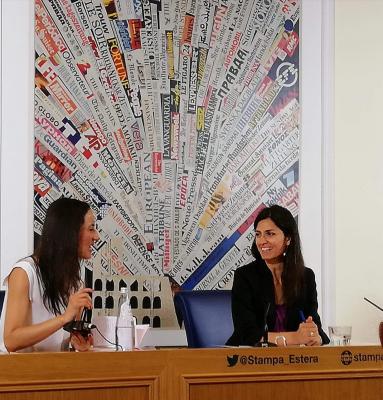Mayor of Rome 'proudly fights against prejudice'

ROME – Two years after the inauguration as Mayor of Rome, the first woman in her millennial history, Ms Virginia Raggi took stock of a partial assessment of her administration by responding to a barrage of questions from journalists from foreign media, at the headquarters of the Foreign Press Association in Rome. The young mayor, 40, of the Five Star Movement, based on the various questions, sometimes controversial and sometimes inspired by the Italian media less friendly to her, has quickly retraced the serious difficulties with which she finds herself fighting every day: urban decay and social, the bad roads, the disposal of waste, the bureaucratic stratification that slows down the interventions, the difficulties of public transport, the heavy debt of 13 billion euros inherited from the right and left administrations.
With the precision of arguments and concreteness of elements of fact, she knew how to counteract the misinformation often contained in the questions, highlighting the reality of the life of a city that finally has a “friendly government” with which to collaborate for the solution of long-standing maintenance problems and management.
The mayor has not hidden difficulties and delays but has insisted in reiterating that her administration has embarked on a valid path and always at the service of the citizens, even in a state of daily attacks, especially from mass media, which are not very objective because they are addressed by interested property. Recalling how her predecessor, Prof. Marino, had been ousted by his own party, she announced that she has planned an investment of 167 million euros for the purchase of 600 new urban buses between 2019 and 2020, and that, to redo the 8000 km roads of Rome, would take at least 10 years for an investment of over 250 million. With a polemical but certainly well-founded note, Virginia Raggi said that “before the asphalt in Rome was closed with the bribes,” to signify the level of corruption that infected, and still infects, the administrative life of the city.
On the recent news of the arrest of various persons involved in an allegedly corrupt activity related to the construction of a new stadium, the Mayor said that those who made a mistake will pay.
Overall, about two hours of a profitable debate with the hope of giving a less catastrophic image of a city that remains unique in the world for the attractiveness of tourists and for its artistic and historical beauties.


